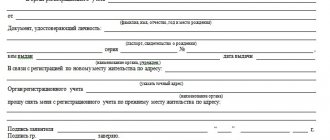Is there a reason?
The social apartment is owned by the municipality (as opposed to a privatized apartment, which belongs to a specific citizen or legal entity).
The tenant (alone or with his family) lives in the premises under a social tenancy agreement, which the city government can unilaterally and forcefully terminate. Paragraph 4 of Article 83 of the Housing Code clearly states the grounds that give a legal right to eviction.
1. Use of housing for other purposes
The residents turned the premises into a commercial warehouse, converted them into a car repair shop, a hostel for migrants, etc.
2. Actual non-residence
A person has not been living at his place of registration for more than a year and does not appear in a social apartment. To prove this in court, you will have to work hard. Our practice proves that it is very difficult to discharge a non-resident from a municipal apartment, but with a legally competent approach it is possible.
IMPORTANT! If a person has acquired ownership of housing (bought, received as a gift or inheritance, won the lottery), then he is obliged to voluntarily check out of the social apartment.
3. Utility debt
Failure to pay utility bills for more than 6 months is a valid reason for eviction. But the judge will certainly take into account whether the debtor tried to negotiate a deferment and whether he has a valid reason for non-payment, for example:
- delay in payment of earnings;
- layoffs and inability to find a job (official status of unemployed);
- long-term stay in a medical institution (at home) with a serious illness;
- disability with loss of ability to work;
- obtaining low-income status (single mother, large families, etc.).
ON A NOTE! A valid reason is always documented in court. If you do not know what documents to collect as evidence, contact a housing lawyer.
4. Deprivation of parental rights
Based on Article 71, paragraph 3, parents deprived of their rights must live separately from their children. And in 98% of cases, the judge makes a decision on resettlement.
5. Damage to property and violation of residence rules
Intentional and repeated damage to municipal property, as well as long-term infringement of the interests of neighbors, are usually considered in conjunction with other grounds. Let’s say that a chronic alcoholic who has turned his apartment into a brothel, does not pay for utilities, and gets into rows almost every day can be evicted from social housing.
Features and nuances
Is it possible to force a person out of a municipal apartment? The procedure for deregistration from a municipal apartment has some peculiarities, since it can take place not only at the request of the resident, but also against his will in cases specified by law.
How to be discharged from a municipal apartment through the court? Discharge may be carried out by court decision in cases where the resident:
- for a long time did not make payments for the use of the premises and utilities;
- created inconvenience to neighbors;
- does not actually live in the provided municipal premises;
- deteriorated the premises or used them for other purposes;
- ceased to be a member of the employer's family (read about the discharge of an ex-husband or wife).
In the case of a voluntary deregistration, the application can be submitted by the deregistered person or his representative using a notarized power of attorney, and the owner, neighbors, employer and other interested parties can forcefully apply for this in court.
Can they be discharged from a municipal apartment without the presence of the person being discharged? When extracting a court decision, the personal presence of the person being discharged is not required, since it is carried out by the interested person if he has a court decision.
Thus, deregistration in municipal housing can occur voluntarily or compulsorily.
However, there must be reasons for this and evidence of the existence of such reasons.
The extract is free of charge and usually does not take much time.
In any business, there must be order that must be followed for a positive final result. Registration in an apartment that directly belongs to the municipality has its own characteristics and another side of complexity.
Where to contact
There are several ways to register in a premises intended for housing, which is taken for use on the basis of a social tenancy agreement:
- at the regional department of the Federal Migration Service;
- at the nearest Multifunctional Center;
- at the Housing Administration passport office.
You can register through the State Services website. This method is convenient because it does not take much time and does not require leaving your home or work office. After accepting the documents, the citizen must visit the municipal office of the FMS or MFC.
To register in premises intended for residence, you must prepare a number of documents:
- valid passport;
- confirmation of discharge from previous place of residence;
- military service ticket;
- information about family members;
- certificate confirming marriage (for registering families);
- a certificate confirming the birth of children (if their age is less than 18 years old); for children over 14 years old, personal presence during registration procedures is required;
- landlord's consent;
- application for registration.
All papers must be reliable and reflect all the necessary information about the person being registered. If a counterfeit or discrepancy is detected, you will not be able to register until it is corrected. Documents must be submitted both in original and copies.
To register, you must be personally present during registration. If for any reason this cannot be done, then a notarized power of attorney must be presented.
We suggest you read: How to write a counter-statement to the court
Consent from the employer is provided in free written form. This happens directly to the passport office employee. The permit must contain all the information about the citizen being registered, as well as the real address of the municipal apartment.
Procedure
It is possible to register in housing belonging to the municipality after following the procedure.
- Collection of registration documentation.
- Submission of all documents to one of the authorities (passport office, MFC, FMS or electronic portal).
- Waiting for approval and production of documents confirming registration.
- Obtaining documents confirming registration (certificate or stamp in passport).
If the documents were submitted through the electronic portal of State Services, then a date is set when the citizen must visit the FMS to complete registration actions.
Timing and cost
The period for obtaining registration in municipal housing depends on the method of submitting documentation. On average it takes 3-8 business days. The fastest way to register is the electronic website of the State Services and the department of the Federal Migration Service. If the documentation was submitted in another way, it will take the maximum number of days.
If a citizen does not provide some documents, but simply indicates their data, then the registration result will be available in more than 8 working days.
Anyone who meets the prescribed standards has the right to register in a municipal apartment.
To the husband (wife)
Registering to live with your husband or wife does not take much time and is carried out without hindrance. To do this, you need to provide the original marriage certificate and the presence of both parties. All registration documents must have the signatures of both the husband and wife.
Minors
A child under the age of majority is registered in housing owned by the municipality without obtaining written permission from other persons. If mom and dad have different registrations, then one of them will need a document confirming that he is not registered with him.
To register, you will need the following documents:
- document confirming the birth of a child;
- passports of father and mother;
- marriage document;
- certificates of registration of parents at a particular address.
In order for a child to have registration in a municipal apartment where there are several residents, including his parent, there is no need to obtain permission from all those registered.
If the child is an orphan, then he is registered where the person who took guardianship of him lives, for example, with his own grandmother.
Relatives
It is possible to register with close relatives living in municipal housing only after receiving the written consent of all registered citizens. In addition, the landlord must also give written consent to registration actions.
The employer himself has the right to register his close relatives (mother, father, brother, sister) upon personal petition. After this, they can claim a share in this municipal-type premises.
Not related
If the person being registered is not a relative and wants to register in a municipal apartment, then for this it is necessary:
- consent of everyone registered in this room;
- consent of the administration that manages this residential premises;
- compliance with the standards for the provision of living space per registered person.
It should be noted that there is a risk of a stranger registering in a municipal apartment. After completing the registration process, he can take part in the privatization of this premises. But a registered citizen can only be evicted with his consent; otherwise, the entire procedure takes place through the courts.
Registration can be refused only if the rules are not followed or the number of square meters does not allow for one more person to be accommodated.
Temporary registration
It is not difficult to obtain a temporary registration in housing owned by the municipality. It is equivalent to permanent registration, but is limited to a temporary period. The period for which it is issued depends on the personal agreement between the landlord and the citizen wishing to register. The minimum period is 6 months, and the maximum is 5 years.
There is no need to cancel the registration; after the expiration of the period, it is automatically invalidated. It is possible to register in municipal housing together with permanent registration at another address.
How to evict your ex-spouse after divorce?
In order to discharge your ex-spouse from a municipal apartment, you will have to find grounds, because the termination of family ties (divorce) is not a reason for evacuation. Since the apartment is owned by the city, at the first stage the municipality decides whether to resettle the ex-spouses or not. If he is not against living together, he will have to seek the truth in court.
EXAMPLE. The Ivanov spouses living under a social tenancy agreement divorced. The woman refused to voluntarily return to her mother’s one-room apartment, so the husband, as a responsible tenant, began to think about how to get his ex-wife out of the municipal apartment. He approached the owner, represented by the city authorities, with a request for resettlement, but was refused. A lawsuit did not help either: there were simply no grounds for eviction - the wife regularly paid for her share of the utilities, lived permanently, was not deprived of parental rights, etc.
Discharge of children from social housing
Separately, it is worth mentioning the complexity of cases related to children’s discharge. The law protects the interests of minors especially carefully, and in order to discharge a child from a municipal apartment, you will have to obtain the approval of the social security authorities.
To receive a positive decision from social security, it is necessary that:
- after discharge, the child was required to be registered in a new place;
- the new living conditions were no worse than the old ones;
- the move did not infringe on the children's interests.
You will need to collect and provide an impressive package of documents, and a lawyer from the First City Legal Aid Service is ready to help with this. He will also act as a confidant during negotiations with representatives of social security and will make every effort to obtain a positive conclusion. If you don’t know how to remove a minor child from a municipal apartment, call and get free answers.
How to discharge a person from a non-privatized apartment without consent
Temporary registration provides for a certain temporary duration, i.e. when registering a citizen for temporary registration, a specific period of stay at a given address is negotiated and prescribed.
If a citizen wants to leave the place of his temporary registration ahead of schedule, he must be deregistered. It is worth considering that upon expiration of the registration period, registration cancellation occurs automatically. Let's take a closer look at how to terminate temporary registration early.
We invite you to read: Medical certificate for traveling abroad No. 82
Early removal from temporary registration can be initiated either by a citizen who has temporary registration or by the owner of the property, which is the place of registration. The last option is otherwise called forced.
The grounds for voluntary early deregistration may be: the end of treatment, vacation, business trip, or study. It is not necessary to have any good reason; a citizen may simply want to move to a new place of residence.
The reasons for forced cancellation of registration may be the personal reasons of the citizen who provided a place for temporary residence, including unlawful actions of the resident. In addition, the FMS has the right to remove from temporary registration if a citizen provides false information when registering.
Before canceling temporary registration, a citizen must write an application. You also need to present a civil passport and a certificate of temporary registration. When canceling the registration of a child under 14 years of age, it is necessary, in addition to the above documents, to provide a birth certificate.
If the initiator of the termination of the temporary registration is the owner of the property in which the registered citizen lives, then, in addition to a passport and application, he will need a document certifying the ownership of this property. In this procedure, the presence of the citizen being deregistered is not necessary.
There are other situations in which a person registered in a municipal apartment can be evicted from it without consent and even without being provided with another place of residence.
It will be possible to discharge a person without consent through the court if the plaintiff confirms in court the fact that the defendant has lost the right to use non-privatized housing. To do this, the party applying to the court with a statement of claim must provide convincing evidence of the need for an extract.
Notifying the landlord of facts that may be the reason for going to court is an important condition that must be met before evicting a registered person from non-privatized housing in court.
The fact that a citizen has received a warning letter from the municipality will be important evidence confirming the competence of going to court if the defendant has not corrected the situation.
Most often, the problem arises precisely in the fact that the person who needs to be discharged is categorically against it. Of course, a person is not ready to lose the housing that suits him, for which, moreover, he needs to pay significantly less than for a regular apartment (not to mention rent).
Procedure
To forcibly remove a person from a municipal apartment, you need to:
- Prepare evidence that may be considered as grounds for deregistration.
- Submit an appeal to the local administration. Any document in free form will be sufficient.
- Submit evidence and appeal to the administration.
- Wait for a reaction. This usually involves sending a complaint to the tenant. If there is no response to the claim (or it is ignored), then after that a lawsuit is filed in court.
- Court hearing. Typically, apartment residents are not asked to participate in such meetings, however, if they are important evidence, they will also be called.
- After considering the case, the court makes a decision and transfers it to the administration. This document does not come into force immediately, but only after 1 month, so you will have to be patient.
- Only after the court decision comes into force will the administration be able to discharge the tenant.
Documentation
Everything else will be collected, prepared and directed by the administration. Residents do not have the right to do this, since they are not the owners of the apartment.
Costs and deadlines
There will be no costs for residents. You don’t even need to pay a state fee when going to court, since, in fact, the claim is filed not by the residents, but by the city administration that owns the municipal housing.
But with deadlines everything is much more complicated. In such a situation, it is difficult to control each stage of the procedure and, assuming that the municipality is not particularly interested in solving the problem, we can assume that the entire process will take from 4 months to a year.
First steps and going to court
A free consultation with a lawyer on housing issues online or by phone +7495-53-222-13 is the first thing everyone who decides on a housing issue with an extract should do.
You will receive qualified explanations and answers to any questions, taking into account specifics, including:
- How to discharge your ex-husband from a municipal apartment if he lives at a different address but pays for utilities?
- How to relocate a minor after parents divorce?
- How to prove the fact of non-residence?
- How to discharge a tenant from a municipal apartment on the initiative of those who are not included in the social rent order?
With the help of a lawyer, you can best prepare for court hearings:
- collect a complete package of documents;
- file a well-drafted claim;
- defend interests at meetings in a reasoned manner;
- you will achieve eviction not only on paper, but also in reality.
Ask a lawyer for advice right now to gain time and solve the problem legally and in a civilized manner!
How can a person who lives there be discharged from a municipal apartment through the court?
Features of registration and deregistration in municipal housing are prescribed in the Housing Code.
A tenant can be discharged peacefully, with his voluntary consent, or with the involvement of a court.
One of the most popular proceedings in court is the process of eviction from an apartment.
In order to discharge a person, you must have solid reasons and evidence in the form of documents confirming the reason.
Dear readers! Our articles talk about typical ways to resolve legal issues, but each case is unique.
If you want to find out how to solve your particular problem, please use the online consultant form on the right or call. It's fast and free!









